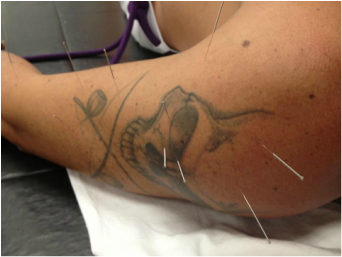Acupuncture originated in China approximately 3,000 years ago, and its techniques have evolved through centuries of clinical observation, testing, and critical thinking. It helps the natural energy of the body work to safely and gently promote health. This energy, known in Traditional Chinese Medicine as qi ("chee") is the fundamental force that gives life, movement, and form. Disease, pain, and illness occur when qi is imbalanced and not flowing smoothly along the meridians. Acupuncture seeks to restore this smooth flow by inserting fine needles at relevant body points. Such points have proven effective over the centuries and are now known to be areas of decreased electrical resistance. Acupuncture has been proven to release endorphins (the bodies natural pain killers), promote circulation, reduce inflammation, and to stimulate the immune system. The NIH released a statement in 1997 showing the effectiveness of acupuncture in several of the conditions listed below, and MRI results have shown that it slows metabolism in areas if the brain associated with anger and fear. The WHO has recommended it as treatment for more than forty common conditions, again listed below.

Along with the needles other therapies are also employed. Moxibustion or the burning of common Mugwort (Artemisia Vulgaris) helps to warm and stimulate the flow of qi, especially in areas where it may be blocked. Very low voltage electrical stimulation may be used, as well as cupping, gwa sha, and magnets. Dietary changes, herbs, supplements, and exercises may also be recommended to complement the treatment. Generally effective acupuncture treatment will require more than one session, and the number of sessions will vary with the duration of the illness. It is a cumulative process. The more chronic the issue the more sessions tend to be necessary. Acupuncture may be used either along with Western Medicine (for example in treatment of nausea and other side effects of chemotherapy) or on its own. It greatly increases the efficacy of fertility treatments like IVF when the modalities are combined.

In order to make a diagnosis the acupuncturist will take into account many factors not traditionally considered in Western Allopathic Medicine. A very detailed history will be taken and many questions asked in order to fully understand the presenting pattern of illness and to formulate a plan for treatment. Such techniques as examination of the tongue, careful observation of the pulse, and palpitation of different areas of the body will be used as well.
The Needles are sterile and disposable. They are thin, approximately two to three times as thick as a human hair...much smaller than those used to give injections. They are inserted from 2 to 3 millimeters (1/4 inch) to one inch in depth. At most a slight pinprick will be felt at insertion (if you have had a shot you have been through worse). Once the needle is inserted certain sensations may be felt such as tingling, warmth, heaviness, or numbness. These are signs that the needle is accessing the energy of the body, a positive prognostic indication that tell us it is working. the most common points of insertion are the back, arms, and legs.
Acupuncture can effectively treat the following conditions:
The Needles are sterile and disposable. They are thin, approximately two to three times as thick as a human hair...much smaller than those used to give injections. They are inserted from 2 to 3 millimeters (1/4 inch) to one inch in depth. At most a slight pinprick will be felt at insertion (if you have had a shot you have been through worse). Once the needle is inserted certain sensations may be felt such as tingling, warmth, heaviness, or numbness. These are signs that the needle is accessing the energy of the body, a positive prognostic indication that tell us it is working. the most common points of insertion are the back, arms, and legs.
Acupuncture can effectively treat the following conditions:
- Colds and Flu
- Allergies
- Asthma
- Sinusitis
- Rhinitis
- Bronchitis
- Eye pain and Glaucoma
- Sore throat
- Toothache
- Otitis (Ear Infection)
- Heartburn
- IBS and Colitis
- Indigestion and Heartburn/GERD
- Diarrhea
- Constipation
- Gas
- High or low Blood Pressure
- Infertility
- Impotence
- PCOS and PID
- PMS
- Cramps
- Irregular periods
- Menopausal symptoms
- Arthritis
- Chronic Pain/Neck and Back pain
- Carpal Tunnel
- Tendonitis
- Insomnia
- Chronic Fatigue
- Hemorrhoids
- Smoking Cessation
- Neuralgia
- Bell's Palsy
- Depression
- Post stroke paralysis and aphasia
- Hypo and Hyperthyroidism
- Injuries (Sports, Auto Accident, Falls, etc)
- Sciatica
- TMJ
- Whiplash
- Nausea
- Headaches or Migraines
- Drug Addiction
- Stress
- Anxiety
- Bursitis
- ADD/ADHD
